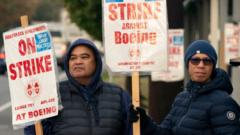Striking workers at Boeing are gearing up for an important vote on a newly proposed pay offer by the aerospace giant aimed at concluding a lengthy seven-week standoff that began on September 13. The International Association of Machinists and Aerospace Workers (IAM) union, which represents over 30,000 employees involved in the strike, has officially endorsed the new deal, asserting it will hold a ballot on Monday.
The proposal from Boeing includes a 38% pay increase over the coming four years, which has generated significant interest amongst the workers following two previous rejected offers, the last of which was a 35% increase. The union initially demanded a 40% raise to keep up with rising living costs, and it appears that the current offer is a compromise towards achieving their objectives. In addition to the salary increase, the updated offer features a bonus that has been raised from $7,000 to $12,000, contingent upon the acceptance of the agreement.
IAM's recent communications portray a sense of accomplishment, encouraging members to embrace the proposed gains, with a call to "lock in these gains and confidently declare victory." Boeing, on the other hand, is urging its employees to review the enhanced proposal and participate in the voting process.
In terms of compensation, if accepted, the new offer would elevate the average annual salary of Boeing workers to around $119,309 over the next four years. The company also plans to make adjustments to its workers' retirement benefits, providing additional incentives for the employees.
Financially, Boeing has faced challenges during the strike, with the commercial aircraft division reporting substantial operating losses amounting to $4 billion for the months leading up to the end of September. The company's share prices saw a slight uptick of 2.7% in extended trading following the announcement of the ratified deal.
With looming pressures of potential downgrades in credit ratings if the strike persists, Boeing has also initiated a share sale strategy intending to raise over $20 billion alarmingly amid this financial strain. Meanwhile, plans for laying off approximately 17,000 employees are underway, with initial redundancy notifications expected to begin mid-November.
The ongoing challenges facing Boeing initiated earlier in the year with an incident involving mid-air structural damages to one of its passenger aircraft, compounded by setbacks in its space exploration endeavors, marking a tumultuous period for the firm.
The proposal from Boeing includes a 38% pay increase over the coming four years, which has generated significant interest amongst the workers following two previous rejected offers, the last of which was a 35% increase. The union initially demanded a 40% raise to keep up with rising living costs, and it appears that the current offer is a compromise towards achieving their objectives. In addition to the salary increase, the updated offer features a bonus that has been raised from $7,000 to $12,000, contingent upon the acceptance of the agreement.
IAM's recent communications portray a sense of accomplishment, encouraging members to embrace the proposed gains, with a call to "lock in these gains and confidently declare victory." Boeing, on the other hand, is urging its employees to review the enhanced proposal and participate in the voting process.
In terms of compensation, if accepted, the new offer would elevate the average annual salary of Boeing workers to around $119,309 over the next four years. The company also plans to make adjustments to its workers' retirement benefits, providing additional incentives for the employees.
Financially, Boeing has faced challenges during the strike, with the commercial aircraft division reporting substantial operating losses amounting to $4 billion for the months leading up to the end of September. The company's share prices saw a slight uptick of 2.7% in extended trading following the announcement of the ratified deal.
With looming pressures of potential downgrades in credit ratings if the strike persists, Boeing has also initiated a share sale strategy intending to raise over $20 billion alarmingly amid this financial strain. Meanwhile, plans for laying off approximately 17,000 employees are underway, with initial redundancy notifications expected to begin mid-November.
The ongoing challenges facing Boeing initiated earlier in the year with an incident involving mid-air structural damages to one of its passenger aircraft, compounded by setbacks in its space exploration endeavors, marking a tumultuous period for the firm.




















